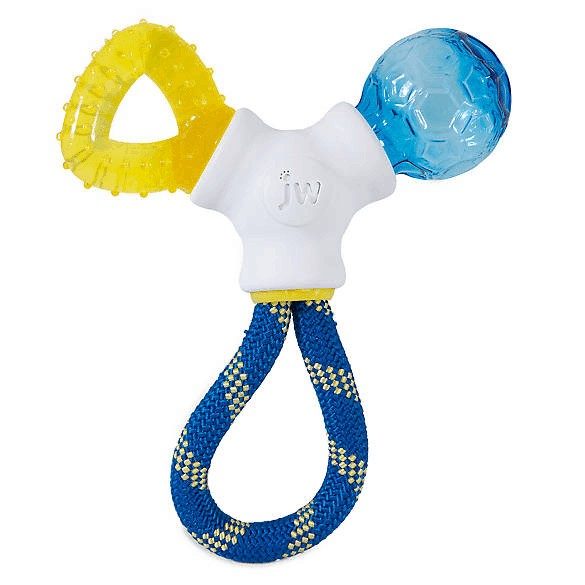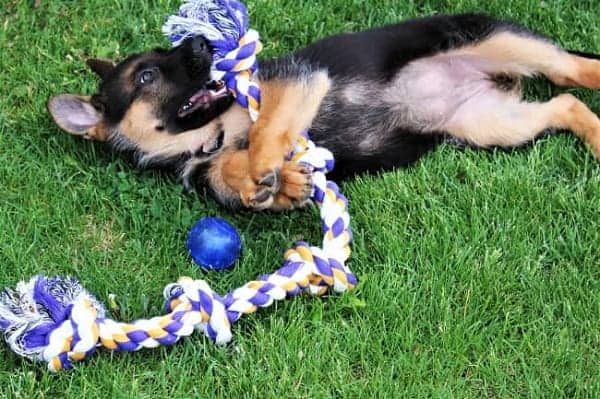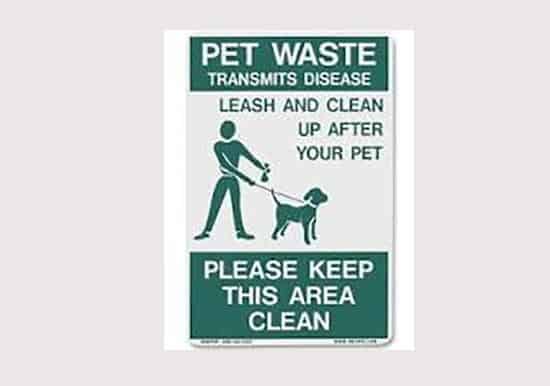Puppies need to play, and they need toys! But picking out the right toy is essential as hard toys can fracture teeth and soft cloth toys can be swallowing risks that cause gastrointestinal obstruction. So, what a good pet parent to do?
We will focus on safety but also on what your dog likes to play with. Also, the veterinarians and their staff may all have different opinions as there is no across-the-board consensus. Just as individual dogs prefer different types and textures, different veterinarians prefer the type that doesn’t cause damage that they see most commonly.

Play time with toys should be supervised when you are dealing with a puppy because you never know if they will choke on it, swallow part of it, or ruin their incoming adult teeth. With puppies, it’s mostly about what they should not play with rather than what they should.
Puppies like to chew, especially when they are teething, around age 3-7 months, a bit longer for small breeds. Many toys are available for help with teething. Chewing helps relieve teething pain, which lasts for months, plus it gives them something to do whether you are involved or not. Chewing also helps avoid boredom.
Interacting during play time with your puppy is one of the easiest ways to establish a bond with your puppy, but let common sense dictate what you let them play with.
Better Toys
Generally speaking, these types of toys are considered to be safe for puppies:
- Toys made from hard nylon.
- Balls and chew toys made of hard rubber.
- Vinyl or plastic chew toys for light chewers unless part is bitten off, these toys are not good
for hard chewers - Food puzzle toys can be used at 6-8 weeks of age
Broadly, according to veterinary dentist Dr. Fraser Hale, he uses what he calls the Kneecap Rule: “If you wouldn’t want me to hit you in the kneecap with it, don’t let your dog chew on it!” The concern is harder toys can damage your puppy’s adult teeth.
Rope toys are not approved of or disapproved of across the board from veterinary dentists. Some veterinary dentists like rope toys, and some dentists disapprove of them. One concern is that puppies can stick their long, sharp canines into the rope, get caught, and then snap off a canine tooth while trying to get unstuck. You can try one while there to monitor and see what your puppy does with it.
Tips to Remember
Toys made for the small mouths of an 8-to-10-week-old puppy may cause a 6-to-9-month-old to choke. Keep the size of the toy appropriate for your puppy’s size.
Letting puppies chew on old shoes means they will think all shoes are fair game. He/she cannot tell the difference between which shoes you care about and which you don’t.
Keep interest up by rotating your puppy’s toys every few days so that the old toys seem new again.
Toys should always be big enough that the puppy cannot swallow them.
Marketing is not necessarily truthful. Just because the package says it’s good for your puppy doesn’t mean it is and doesn’t mean it isn’t. If you question a toy’s safety, ask your veterinarian about it.
Just because the toy is deemed “safe” does not mean it can’t cause a problem of some kind. Puppies should be supervised when playing with toys.
Toys to Avoid
Toys that are generally not safe – and much of this depends on your puppy’s personal preferences – include:
- The hardest of hard toys (the “softer” hard toys are acceptable)
- Rawhide or pressed chews (choking or surgery to remove it from their stomach)
- Long thin strips of anything from yarn to ribbon (linear foreign object)
- Toys stuffed with foam (foam can be swallowed)
- Antlers, pig’s ears, dried cow hooves (those can splinter) – the ears can also have large amounts of bacteria
- Toys with small or sharp metal parts such as eyes, pins, springs, or batteries.
- No cooked bones, EVER, throughout the dog’s lifetime. These are not toys, but should be mentioned.
Tips to Remember
Don’t let puppies hang from a toy by their teeth.
If a piece of a hard toy is chewed off, throw it away because those rubber bits are not digestible.
Some dedicated hard chewers can destroy large hard toys surprisingly fast.
Hooves, antlers, and bones are a risk to any pet’s health. However, they can be a risk trade-off for the dog proven to chew absolutely everything, particularly metal and rocks, and therefore the dog is already going to be at risk of tooth damage and ingesting foreign bodies.
Hard chewers are not confined to specific breeds, although you can assume some terriers will be heavy chewers. Remember that members of other breeds can also chomp right through toys designed for hard chewers.

If you think you can avoid the whole safety concern by not giving them any toys, think again: they will find their own “toys,” all of which will most likely be your belongings, this includes shoes and furniture. The best bet is to give them something appropriate and supervise their play time. You can look for other ways to stimulate and exercise your puppy, though, such as food puzzles, and actively engaging with your puppy by playing fetch with a safe plastic ball, for instance.
What works best for an individual puppy depends on what they like and how hard they chew. It’s a learning process for you and your puppy.
The Bottom Line
Whatever toy you give a puppy or an adult can – but won’t necessarily – cause various negative consequences. Hard toys risk fracturing delicate primary and immature/erupting adult teeth, whereas soft toys risk ingestion and GI obstruction. Given how many toys cannot be generalized as acceptable or not by veterinary dentists, your safest approach is to talk to your veterinarian about your dog. Your veterinarian knows your dog and is in the best position to help.
Remember to always supervise puppies while they play with toys in case something happens. And it’s fun to play with your pooch!


